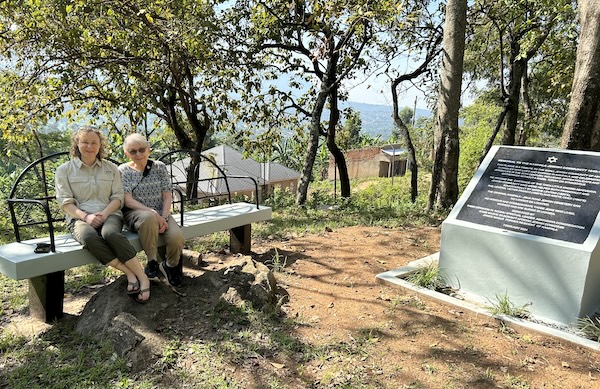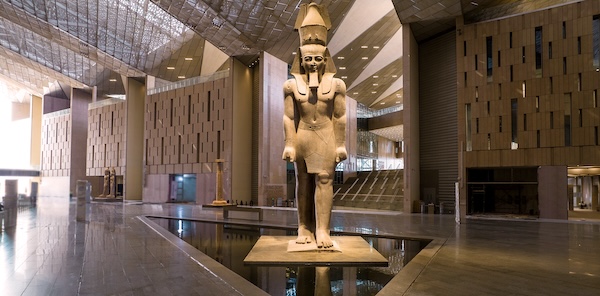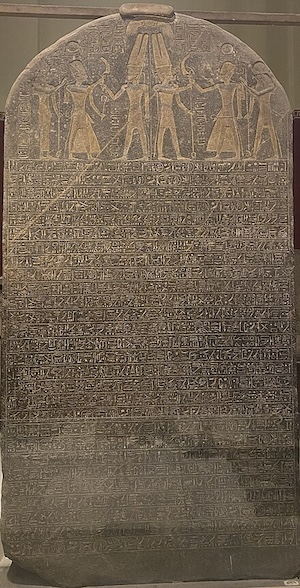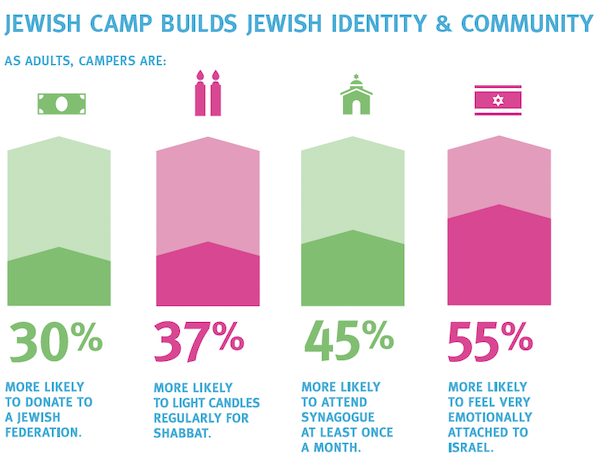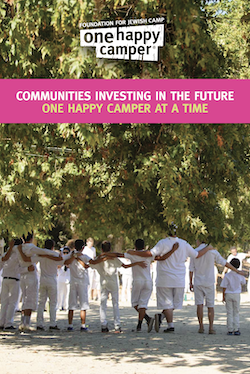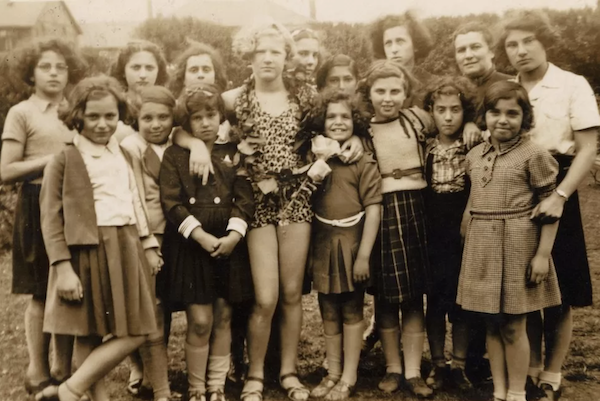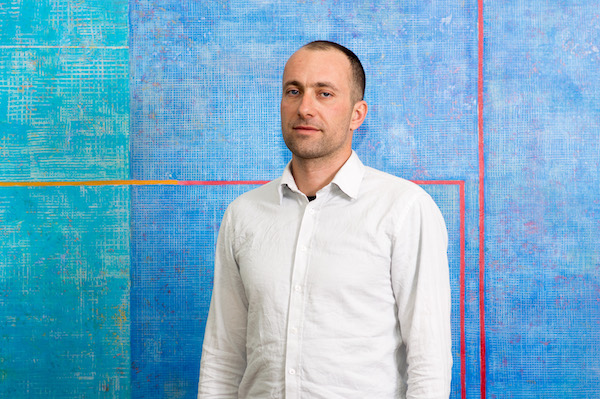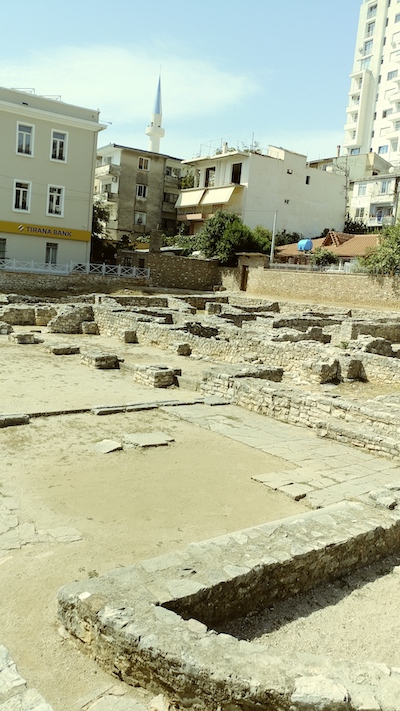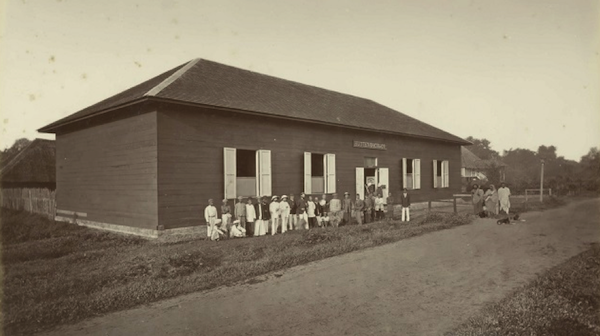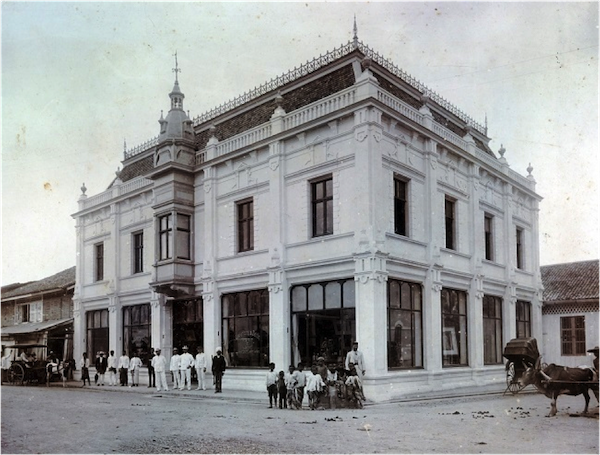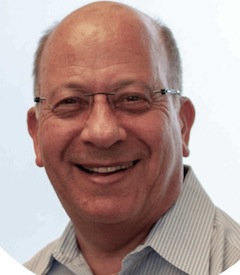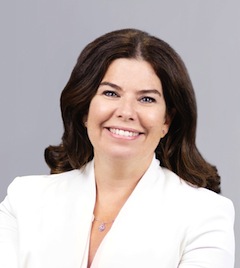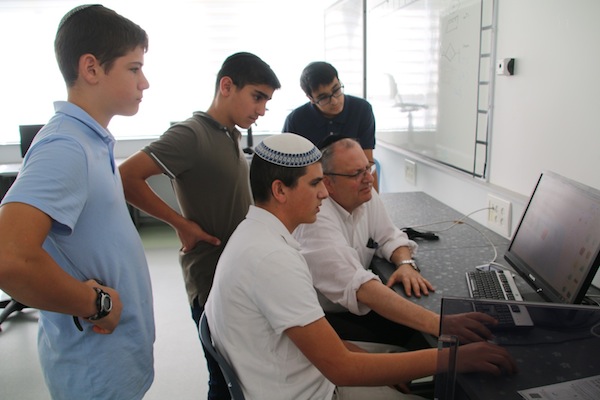Janice Masur and her daughter, Liora Freedman, on March 3, after unveiling the memorial plaque in Nagoya village near Mbale, Uganda. (photo from Janice Masur)
I have just come back from Uganda, where my family used to live, in the Jewish community that existed from 1949 to 1961. My daughter, Liora, had returned 10 days earlier, as planned. I had to stay longer because my passport had been stolen two weeks previously, off my lap while sitting in a slow-moving car. Thankfully, after Liora involved my local member of Parliament, my temporary Canadian passport, processed in Nairobi, Kenya, finally arrived in Kampala, and I was able to leave.
Although still essentially an agricultural economy, Uganda is touted to visitors as the most entrepreneurial country in Africa. Most people in the countryside have a small plot to grow their own food and sell the surplus. Large-scale plantations of sugar cane, tea, coffee and bananas are grown for export. The Pearl of Africa is rich in mineral deposits and China is beginning to drill for oil on the edge of Murchison Falls National Park.
I could not find my way around Kampala anymore. It used to be a self-contained town situated over seven hills. Now it sprawls and spreads in all directions with Ugandan street names I can barely pronounce. My old house has a high fence and a guard at the gate, with a gun slung across his shoulder, who wouldn’t let us enter. I was charmed to find the same small five-petaled purple flowers floating down like tiny propellers, strewn on the driveway just as they had done in my childhood. Across the rutted road, there was a new modern hotel instead of modest houses.
We drove up Kibuli Hill to see Kibuli Mosque. In my day, the mosque was a friendly looking place of worship. I was shocked to see how fortress-like it had become, painted grey instead of white, with the words “None shall be worshipped but Allah. Muhammad is his prophet.”
I tried to find my bearings on Tank Hill – named for the three extremely large round water tanks in the neighbourhood – where we had once lived but couldn’t. Instead of being given help, I was told not to take photos, or I might be thought to be spying on an army unit. Important ministers travel in cars with armed guards seated outside of the cars facing sideways, guns at the ready.
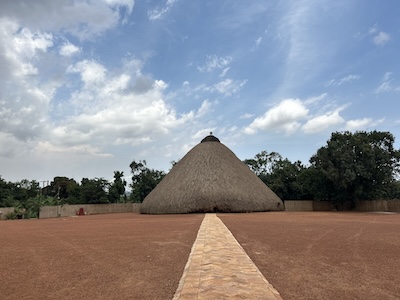
I visited the Kasubi Tombs, where the kabakas, or kings, have been buried since pre-Christian times. I had never known about this sacred UNESCO site when I lived in Uganda. A steep thatched roof, reaching almost to the ground covered intricate woven designs in the inner ceiling of one of the tombs. It was my absolute luck to have Prince Joseph as my tour guide. When I showed him a photograph, he told me proudly that he was the grandson of Edward, the brother of the kabaka, Mutesa II or Freddy, who was one of the two Ugandan men in the picture.
My purpose for traveling to Uganda was to unveil two memorial plaques for my Jewish community, which had been there from 1949 to 1961. None of the community infrastructure exists today, not even the cemetery, now submerged under real estate.
We placed a plaque in the Nagoya village near Mbale, where the Abayudaya, who converted to Judaism in 1921, live. Conservative Rabbi Gershom Sizomu and his wife, Tziporah, and others in the community were so welcoming and warm, helpful and supportive. We had a wonderful Shabbat evening, with lots of music and drumming, and Shabbat lunch under two large mango trees, with stunning views of Mount Elgon.
On Sunday, the whole community was invited to the unveiling of the plaque. We ambled down to a lower flat piece of land after morning minyan in the synagogue. There were speeches by Rabbi Sizomu and by Rabbi Netanel Kaszovitz, a young Orthodox rabbi visiting from Nairobi, who is responsible for administering to all the Orthodox Jewish communities in East and West Africa. The plaque glowed in the dappled sunlight. Two newly planted mango trees and two benches were nearby, offering enough room for a minyan, at Rabbi Sizomu’s request. The white lettering on the black granite looked impressive; beautifully supervised by Ariel Okiror Eyal.
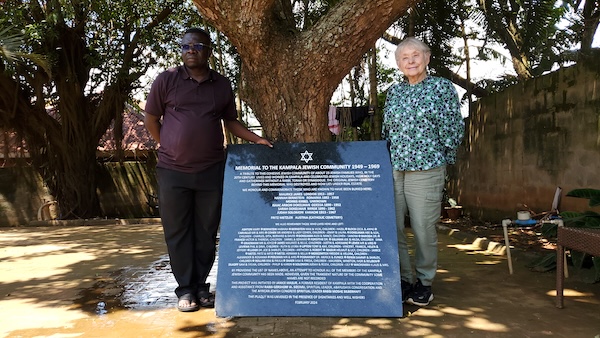
I experienced all sorts of conflicting emotions, as you might imagine. At long last a plaque to commemorate the help that my Uganda Jewish community had given the Abayudaya last century was installed. Nothing had marked the presence of the once-vibrant, secular, 23-family Jewish community, which functioned without a rabbi, a Torah or a synagogue. Who would have guessed that, in 2024, a Conservative and three Orthodox Black Jewish communities would exist, interspersed with Muslim villages?
As for the other plaque I hoped to place, it was for the Jews who were buried more than 60 years ago in the Jewish cemetery just off the Kampala-Jinja Expressway, abutting the Christian cemetery. It is not common knowledge that the Jewish cemetery here had been destroyed and Speke Apartments, built by Dr. Sudhir Ruparelia, lies on top of where it had been. After many months of trying to contact Ruparelia I finally succeeded while in Kampala. In reply to my request to place a plaque somewhere in the vicinity of the apartments, in a discreet corner or on a less important wall, he said “No! None.”
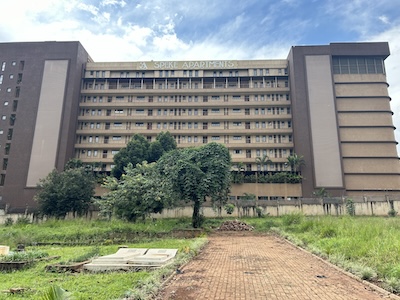
Perhaps I could mount the plaque at the edge of the unkempt Christian cemetery? It requires a Ugandan minister’s permission to approve a location near the 1972 Entebbe Raid plaque at the difficult-to-access old Entebbe Airport. Maybe at the Uganda Museum? The garden of the Chabad compound was also considered. Unfortunately, none of these placements have materialized.
I traveled to Uganda to place two memorial plaques, but my mission was not fully accomplished, and the second plaque lies in storage with Rabbi Sizomu. The Chabad Rabbi in Kampala, Moshe Raskin, said he would try to place it somewhere, perhaps in the future grounds of the new plot of land they will buy for Chabad, because Rabbi Moshe says Chabad is in Kampala to stay.
That I couldn’t find a place to mount the second plaque greatly saddened me. In many parts of the world, history is important and physical spaces or buildings are repurposed and feature plaques to show that a mikvah is buried here or a synagogue was once there. Today, few Ugandans know their local history, including that former governor (1952-1957) Sir Andrew Cohen was a British Jew. He was the first governor not to plunder Uganda’s wealth and he encouraged education and self-rule.
Now it is my task to contact my East African friends and perhaps schools and associations because Albert Kasozi, executive director of Buganda Heritage and Tourism – to whom Prince Joseph introduced me while we drank African tea at my hotel – would like as much 19th-century Bugandan history collected as possible for a new museum that has just been built in Kampala and will be formally opened soon. The banner exhibit I created, Shalom Uganda, will find a home in this new museum and I am very happy about the prospect. And the Kampala memorial plaque? To be determined….
Janice Masur is a Vancouver author and speaker. Her book, Shalom Uganda: A Jewish Community on the Equator, tells her story of growing up in the bygone Ashkenazi Jewish community of Kampala from 1949 to 1961.

